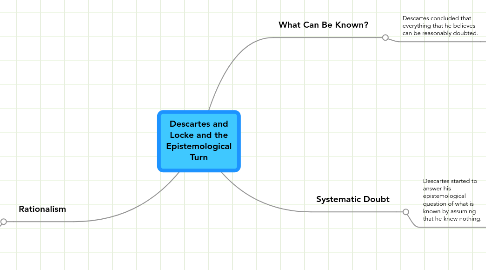
1. Rationalism
1.1. According to Rationalist knowledge can be obtained through a priori reasoning.
1.1.1. A priori reasoning is knowledge independent of experience.
1.1.2. A priori reasoning, for the Rationalists, is the key for unlocking knowledge of the natural world.
1.1.3. Innate Ideas
1.1.3.1. To the Rationalists the idea of "perfection" is not possible for imperfect human beings so that these ideas are the result of innate ideas.
2. What Can Be Known?
2.1. Descartes concluded that everything that he believes can be reasonably doubted.
2.1.1. Our "reality" can be a dream.
2.1.1.1. Humans cannot tell the difference between a dream and reality.
2.1.1.1.1. Therefore we cannot know whether we are in a dream state or whether what we are experiencing is reality.
2.1.2. Presence of a Perfect Being.
2.1.2.1. Since humans are imperfect then the idea of a Perfect Being is not possible unless there is a a Perfect Being to put the idea in a human's head.
2.1.2.1.1. Perfect Beings (God) exists.
3. Systematic Doubt
3.1. Descartes started to answer his epistemological question of what is known by assuming that he knew nothing.
3.1.1. Establish what beliefs are certain.
3.1.1.1. The beliefs that are certain are the building blocks for discovering other beliefs that are true.
3.1.2. If there is reason to doubt a belief get rid of it.
